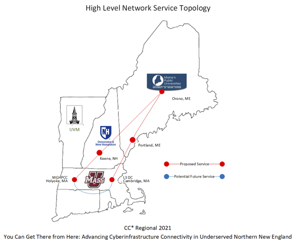
Orono, Maine — The National Science Foundation (NSF) awarded the University of Maine System (UMS) nearly $1 million to build new cyberinfrastructure that will expand the state’s access to scientific data, expertise and learning opportunities across New England and beyond.
The equipment funded by the $976,496 NSF award will create high-speed, 400 gigabit-per-second (Gbps) network connections between the System’s supercomputer cluster at its flagship institution, the University of Maine (UMaine), and two premier research and education facilities in New England: the Massachusetts Green High Performance Computing Center and the Northern Crossroads Gigabit Point of Presence, the region’s primary connector to Internet2.
“Digital connectivity is essential for the success of Maine’s schools and students in the 21st century – opening up a whole new world of resources and learning,” said U.S. Senators Susan Collins and Angus King of Maine. “The University of Maine System’s ‘You Can Get There from Here’ network will create important new connections to expand scientific collaboration throughout New England and increase education opportunities across our state. This is a perfect example of how modern technologies like broadband connections can bring more opportunities to rural, underserved areas, and bring our state into the future.”
Tapping into these facilities, both of which are dedicated to supporting research and education in New England, will increase the computing capacity of the System’s network infrastructure by more than tenfold. As a result, the new equipment will enhance the ability for Maine researchers, particularly those at small, under-resourced institutions, to share data and resources and collaborate with other experts worldwide. The connection to these hubs also will allow UMS to connect to additional research partners in northern New England in the future by offering intermediate add and drop support in Keene, New Hampshire, and Portland, Maine.
“Research and innovation rely on collaboration and networks, and at times that can be challenging in our rural and remote locations,” said UMS Vice Chancellor for Research and Innovation and UMaine President Joan Ferrini-Mundy. “I want to thank Senators Collins and King for their continued support of investment in science and technology. With this National Science Foundation award, the University of Maine System will connect its cutting-edge computational resources and world-class researchers to colleagues across the Northeast and nation, and students in our state’s PK–12 and postsecondary schools. Together, we can solve problems, and create new knowledge and opportunity for Maine and beyond. This project shows the terrific power and potential of our R1 flagship research university to help strengthen our entire university system, and build Maine’s capacity and global competitiveness.”
Bruce Segee, Professor of Electrical and Computer Engineering at UMaine; will lead the project and collaborate with Jeff Letourneau, executive director of NetworkMaine, a unit of the UMS that provides internet and related-services to various stakeholders across the state; and Garret Peirce, the System’s network architect.
“Virtually all research in the 21st century utilizes computers and high speed networks. Maine has traditionally been at a tremendous disadvantage.” says Segee. “This grant will allow Maine researchers to meaningfully collaborate with the rest of the world, both by making resources outside Maine more accessible, and also by making data and resources in Maine more accessible to the rest of the world.”
Many schools throughout the state use high-speed internet from NetworkMaine, meaning they will benefit from the upgrades to UMS cyberinfrastructure. In particular, the NSF-funded equipment could broaden educational offerings for K–12 students by connecting them with world-class researchers willing to share their work and experiences.
“Maine’s K-12 schools and public libraries have been national leaders in digital learning for decades. This 10x increase in out-of-state capacity will allow us to continue to support their innovation as they bring learning opportunities to all of Maine’s population regardless of location or income,” says Letourneau.
UMS not only tries to improve Maine researchers’ access to resources through cyberinfrastructure upgrades, but also through collaborations with various organizations, including the Northeast Cyberteam, the Ecosystem for Research Networking, the Northeast Research and Education Network, the Open Storage Network and the Open Science Grid.
